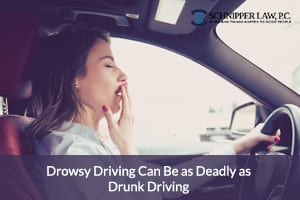Most of us grew up hearing about the risks of driving under the influence and getting a DUI. While the dangers of driving while intoxicated are well-established, many drivers don’t realize that drowsy driving can be just as serious. Drowsy driving may be the result of simply not sleeping enough but it can also be caused by shift work, an untreated sleep disorder, or certain medications. Fatigued driving can increase the risk of a serious car accident in Atlanta just as much as driving under the influence, according to a growing body of research.
The Effects of Drowsy Driving

Drowsiness can come on slowly and a driver may not realize just how tired they are. Many drowsy drivers even experience a phenomenon called micro-sleep, which is involuntary but short bursts of inattention. Micro-sleep incidents of just a few seconds can be enough for the car to travel the length of a football field at highway speeds. If you have ever been driving while exhausted and suddenly realized you don’t remember passing the last exit, you may have experienced micro-sleep.
How Common Is Drowsy Driving in Atlanta?
1 out of every 25 adult motorists in Atlanta has reported falling asleep behind the wheel in the last month. According to the National Highway Traffic Safety Administration (NHTSA), drowsy driving caused at least 72,000 accidents in 2014 alone and was to blame for 800 fatalities and 44,000 injuries.
It’s believed that drowsy driving accidents are underreported, however. Drowsiness may be a factor in up to 6,000 fatal accidents every year. A study conducted by the AAA Foundation for Traffic Safety estimated that there are almost 330,000 drowsy driving accidents every year.
While anyone may drive drowsy, drivers under 25, especially males, account for half of all drowsy driving accidents. People who work long shifts and shift workers are six times more likely to be involved in a drowsy driving accident. Commercial truck drivers are also at a high risk of sleep disorders and fatigued driving accidents.
Reducing Fatigued Driving
You may think you can tell when you are too tired to drive safely but most people are simply not good at predicting when they will fall asleep. There are many warning signs that you are too drowsy to drive such as:
- Rolling down the window or turning up music to stay alert
- Feelings of restlessness and irritability
- Missing exits or signs
- Tailgating or drifting out of the lane
- Daydreaming
- Repeatedly yawning or rubbing your eyes
- Difficulty keeping your eyes open or staying focused
- Slow reaction time
If you experience any of these signs, it means you are at risk of falling asleep behind the wheel. Immediately pull over somewhere safe to switch drivers, take a nap, or find a place to sleep for the night.
Don’t rely on opening a window or other tricks to stay awake. They simply won’t work. Don’t drive when you would normally be sleeping unless you have rested in preparation for a drive. The best way to avoid a fatigued driving accident is by getting regular adequate sleep and seeking treatment for a sleep disorder.
If you have been injured due to another persons drowsy driving contact the experienced Atlanta car accident lawyer at Schnipper Law P.C. today for a FREE consultation.
